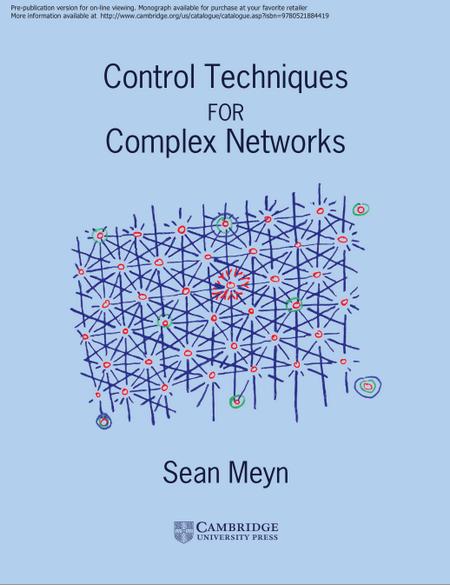
Control Techniques for Complex Networks (Pre-publication Version)
This book gives the tools and philosophy you need to build network models detailed enough to capture essential dynamics but simple enough to expose the structure of effective control solutions and to clarify analysis.
Publication date: 22 Apr 2007
ISBN-10: 0521884411
ISBN-13: 9780521884419
Paperback: 615 pages
Views: 14,091
Control Techniques for Complex Networks (Pre-publication Version)
 This book gives the tools and philosophy you need to build network models detailed enough to capture essential dynamics but simple enough to expose the structure of effective control solutions and to clarify analysis.
This book gives the tools and philosophy you need to build network models detailed enough to capture essential dynamics but simple enough to expose the structure of effective control solutions and to clarify analysis.
Publication date: 22 Apr 2007
ISBN-10: 0521884411
ISBN-13: 9780521884419
Paperback: 615 pages
Views: 14,091
Document Type: Book
Publisher: Cambridge University Press
License: n/a
Post time: 13 Sep 2016 11:00:00
What’s in here?
The book is divided into three parts. The first part entitled modeling and control contains numerous examples to illustrate some of the basic concepts developed in the book, especially those topics listed in (i) and (ii) concerning the fluid and CRW models. Lyapunov functions and the dynamic programming equations are introduced; Based on these concepts we arrive at the Max Weight policy along with many generalizations.
Workload relaxations arc introduced in Part II. In these three chapters we show how a cost function defined for the network can be ‘projected’ to define the effective cost for the relaxation. Applications to control involve first constructing a policy for the low-dimensional relaxation, and then translating this to the original physical system of interest. This translation step involves the introduction of hedging to guard against variability.
Most of the control techniques are contained in the first two parts of the book. Part III entitled Stability & Performance contains an in-depth treatment of Lyapunov stability theory and optimization. It contains approximation techniques to explain the apparent solidarity between control solutions for stochastic and deterministic network models. Moreover, this part of the book develops several approaches to performance evaluation for stochastic network models.
Tweet
About The Author(s)
Professor and Robert C. Pittman Eminent Scholar Chair in the Department of Electrical and Computer Engineering at the University of Florida, the director of the Laboratory for Cognition & Control, and director of the Florida Institute for Sustainable Energy. Academic research interests include theory and applications of decision and control, stochastic processes, and optimization.

Professor and Robert C. Pittman Eminent Scholar Chair in the Department of Electrical and Computer Engineering at the University of Florida, the director of the Laboratory for Cognition & Control, and director of the Florida Institute for Sustainable Energy. Academic research interests include theory and applications of decision and control, stochastic processes, and optimization.